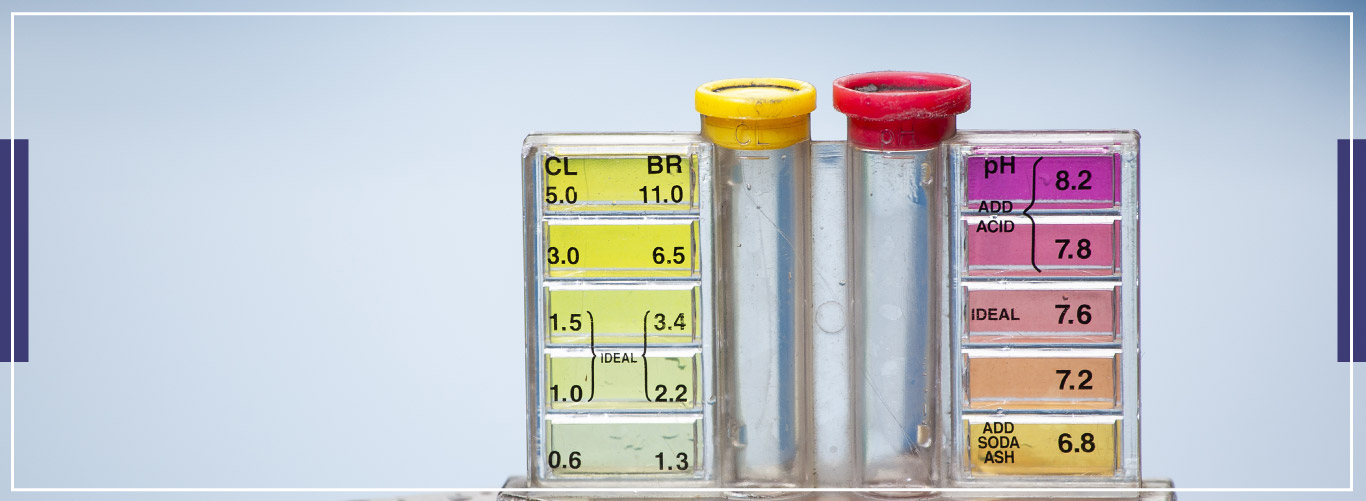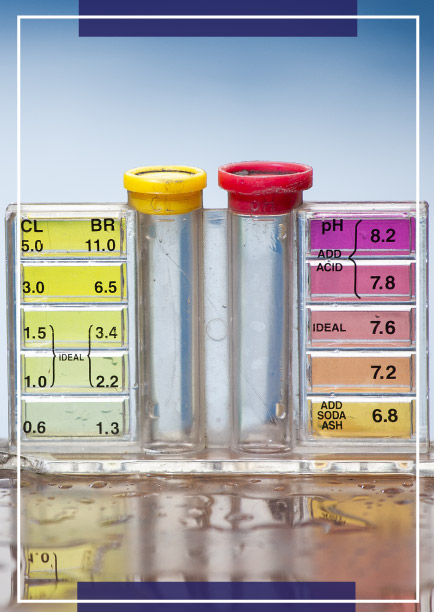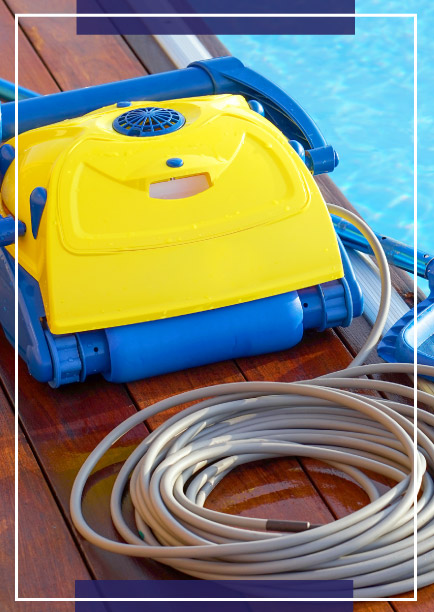What Pool Chemicals Does Your Pool Need?
Owning a swimming pool is a luxury but maintaining it requires an understanding of the necessary chemicals. These chemicals can seem overwhelming, but once you understand their purpose, maintaining your pool becomes a breeze.

Are they necessary?
YES. Your pool requires chemicals to ensure it remains clean, safe and enjoyable for swimming. The water in your pool can easily become a breeding ground for bacteria and algae if not properly treated. Chemicals maintain the pH level of the pool, preventing it from becoming too acidic or too alkaline, each of which could create health risks and damage your pool equipment. Further, chemicals like chlorine and bromine are effective in killing bacteria, while algaecides prevent the growth of algae. Thus, employing the right pool chemicals is key to maintaining a healthy swimming environment.
Understanding Pool Chemistry
The first step to maintaining your pool is understanding pool chemistry. pH is a measure of how acidic or basic the water is. The pH scale ranges from 0-14, with 7 being neutral. Ideally, pool water should have a pH between 7.2 and 7.6, ensuring it’s neither too acidic nor too alkaline.
Sanitisers
Sanitisers are used to maintain the cleanliness of pool water by eradicating harmful microorganisms. Apart from the well know chlorine, bromine is another common sanitiser used in pools. It’s especially effective in hot tubs and spas, as it performs well at higher temperatures and varying pH levels. Bromine tends to be more expensive than chlorine, but it leaves less of an odour and is typically gentler on skin and eyes. Another sanitiser option is Biguanide, a non-chlorine, non-bromine product often marketed as soft and silky water. Though it may be a pricier choice, it’s an excellent option for those with sensitive skin.
pH Increasers and Reducers
Maintaining a balanced pH level is crucial for the overall health of your pool. When the water becomes too acidic, it can lead to potential damage to the pool equipment, resulting in costly repairs. On the other hand, if the pH level is too alkaline, it can cause water to become cloudy and promote the formation of unsightly scale deposits. To combat these issues, pH increasers and reducers play a vital role in restoring and maintaining the perfect balance for crystal-clear, healthy pool water.

Cyanuric Acid
Cyanuric Acid, commonly known as pool stabiliser or conditioner, is a vital component that plays a crucial role in protecting chlorine from the harmful effects of sunlight. Without the presence of cyanuric acid, the powerful rays of the sun would quickly degrade the chlorine, rendering it ineffective in maintaining a clean and safe swimming pool environment. It is recommended to maintain a cyanuric acid level within the range of 30-50 ppm to ensure optimal protection and longevity of the chlorine.
Algaecides
Algaecides are essential in preventing the growth and spread of algae in your pool, especially during hot weather when algae tends to thrive. While chlorine effectively kills existing algae, incorporating an algaecide into your pool maintenance routine acts as a proactive measure, preventing the growth of algae and ensuring crystal-clear water all season long.
Calcium Hardness Increaser
This chemical, known for its remarkable properties, effectively prevents water from becoming corrosive or scale-forming. It works by maintaining the calcium level within the recommended range of 200 to 400 ppm, ensuring optimal water quality and preventing the formation of harmful deposits.
Pool Shock
Pool shocking is the process of superchlorinating the pool to kill bacteria and break down contaminants. You should shock your pool weekly during summers, and less frequently during winters. This process helps in restoring the clarity and sparkle of your pool water by breaking down chloramines, eliminating odours, and removing contaminants.
Total Alkalinity Increaser
In order to maintain the proper balance of your pool, it is recommended that the total alkalinity falls within the range of 80 to 120 parts per million (ppm). This crucial component acts as a pH buffer, ensuring that the pH levels do not experience rapid shifts, which could potentially lead to adverse effects on the overall water quality and comfort of swimmers.
Pool Clarifier
In swimming pools, there are often microscopic particles that are too small for the filter to effectively catch. This is where a pool clarifier comes into play. It works by using special chemicals to clump these tiny particles together, making them larger and easier for the filter to capture and remove. By enhancing the filtration process, a pool clarifier helps to maintain crystal clear water, ensuring a refreshing and enjoyable swimming experience for all.

Other Pool Maintenance Tips
In addition to correctly managing pool chemistry, physical maintenance is necessary to keep your pool in top condition. Regular skimming and vacuuming can help keep your pool looking its best and extend the life of your pool’s components. When you skim the surface of your pool, you remove leaves, debris, and bugs, preventing them from sinking and becoming harder to remove.
A pool’s water level should also be regularly checked and maintained. It can drop due to evaporation, particularly during the peak of summer, or from heavy use. If the water level drops below the level of the skimmer, it might damage the pump. Top up the water level using a hose and adjust the chemical levels accordingly.
Finally, do not underestimate the importance of a regular professional check-up. Though many tasks can be handled by the pool owner, a professional can offer a more in-depth and comprehensive evaluation of your pool’s health. This regular check can help prevent minor problems from becoming costly repairs in the future.
Keeping a regular maintenance routine will ensure you always have a clean, safe, and enjoyable swimming pool for everyone to enjoy. Don’t forget, prevention is better than cure!
To Conclude
Keeping a swimming pool healthy takes effort and a comprehensive approach. Using chemicals like sanitisers and pH adjusters, and doing physical maintenance like skimming and vacuuming, helps keep the water clean and clear. Regular check-ups by pool experts are important too. Just remember, a regular maintenance routine is crucial for a clean and safe pool!
What Pool Chemicals Does Your Pool Need?
Owning a swimming pool is a luxury but maintaining it requires an understanding of the necessary chemicals. These chemicals can seem overwhelming, but once you understand their purpose, maintaining your pool becomes a breeze.

Are they necessary?
YES. Your pool requires chemicals to ensure it remains clean, safe and enjoyable for swimming. The water in your pool can easily become a breeding ground for bacteria and algae if not properly treated. Chemicals maintain the pH level of the pool, preventing it from becoming too acidic or too alkaline, each of which could create health risks and damage your pool equipment. Further, chemicals like chlorine and bromine are effective in killing bacteria, while algaecides prevent the growth of algae. Thus, employing the right pool chemicals is key to maintaining a healthy swimming environment.
Understanding Pool Chemistry
The first step to maintaining your pool is understanding pool chemistry. pH is a measure of how acidic or basic the water is. The pH scale ranges from 0-14, with 7 being neutral. Ideally, pool water should have a pH between 7.2 and 7.6, ensuring it’s neither too acidic nor too alkaline.
Sanitisers
Sanitisers are used to maintain the cleanliness of pool water by eradicating harmful microorganisms. Apart from the well know chlorine, bromine is another common sanitiser used in pools. It’s especially effective in hot tubs and spas, as it performs well at higher temperatures and varying pH levels. Bromine tends to be more expensive than chlorine, but it leaves less of an odour and is typically gentler on skin and eyes. Another sanitiser option is Biguanide, a non-chlorine, non-bromine product often marketed as soft and silky water. Though it may be a pricier choice, it’s an excellent option for those with sensitive skin.
pH Increasers and Reducers
Maintaining a balanced pH level is crucial for the overall health of your pool. When the water becomes too acidic, it can lead to potential damage to the pool equipment, resulting in costly repairs. On the other hand, if the pH level is too alkaline, it can cause water to become cloudy and promote the formation of unsightly scale deposits. To combat these issues, pH increasers and reducers play a vital role in restoring and maintaining the perfect balance for crystal-clear, healthy pool water.

Cyanuric Acid
Cyanuric Acid, commonly known as pool stabiliser or conditioner, is a vital component that plays a crucial role in protecting chlorine from the harmful effects of sunlight. Without the presence of cyanuric acid, the powerful rays of the sun would quickly degrade the chlorine, rendering it ineffective in maintaining a clean and safe swimming pool environment. It is recommended to maintain a cyanuric acid level within the range of 30-50 ppm to ensure optimal protection and longevity of the chlorine.
Algaecides
Algaecides are essential in preventing the growth and spread of algae in your pool, especially during hot weather when algae tends to thrive. While chlorine effectively kills existing algae, incorporating an algaecide into your pool maintenance routine acts as a proactive measure, preventing the growth of algae and ensuring crystal-clear water all season long.
Calcium Hardness Increaser
This chemical, known for its remarkable properties, effectively prevents water from becoming corrosive or scale-forming. It works by maintaining the calcium level within the recommended range of 200 to 400 ppm, ensuring optimal water quality and preventing the formation of harmful deposits.
Pool Shock
Pool shocking is the process of superchlorinating the pool to kill bacteria and break down contaminants. You should shock your pool weekly during summers, and less frequently during winters. This process helps in restoring the clarity and sparkle of your pool water by breaking down chloramines, eliminating odours, and removing contaminants.
Total Alkalinity Increaser
In order to maintain the proper balance of your pool, it is recommended that the total alkalinity falls within the range of 80 to 120 parts per million (ppm). This crucial component acts as a pH buffer, ensuring that the pH levels do not experience rapid shifts, which could potentially lead to adverse effects on the overall water quality and comfort of swimmers.
Pool Clarifier
In swimming pools, there are often microscopic particles that are too small for the filter to effectively catch. This is where a pool clarifier comes into play. It works by using special chemicals to clump these tiny particles together, making them larger and easier for the filter to capture and remove. By enhancing the filtration process, a pool clarifier helps to maintain crystal clear water, ensuring a refreshing and enjoyable swimming experience for all.

Other Pool Maintenance Tips
In addition to correctly managing pool chemistry, physical maintenance is necessary to keep your pool in top condition. Regular skimming and vacuuming can help keep your pool looking its best and extend the life of your pool’s components. When you skim the surface of your pool, you remove leaves, debris, and bugs, preventing them from sinking and becoming harder to remove.
A pool’s water level should also be regularly checked and maintained. It can drop due to evaporation, particularly during the peak of summer, or from heavy use. If the water level drops below the level of the skimmer, it might damage the pump. Top up the water level using a hose and adjust the chemical levels accordingly.
Finally, do not underestimate the importance of a regular professional check-up. Though many tasks can be handled by the pool owner, a professional can offer a more in-depth and comprehensive evaluation of your pool’s health. This regular check can help prevent minor problems from becoming costly repairs in the future.
Keeping a regular maintenance routine will ensure you always have a clean, safe, and enjoyable swimming pool for everyone to enjoy. Don’t forget, prevention is better than cure!
To Conclude
Keeping a swimming pool healthy takes effort and a comprehensive approach. Using chemicals like sanitisers and pH adjusters, and doing physical maintenance like skimming and vacuuming, helps keep the water clean and clear. Regular check-ups by pool experts are important too. Just remember, a regular maintenance routine is crucial for a clean and safe pool!


